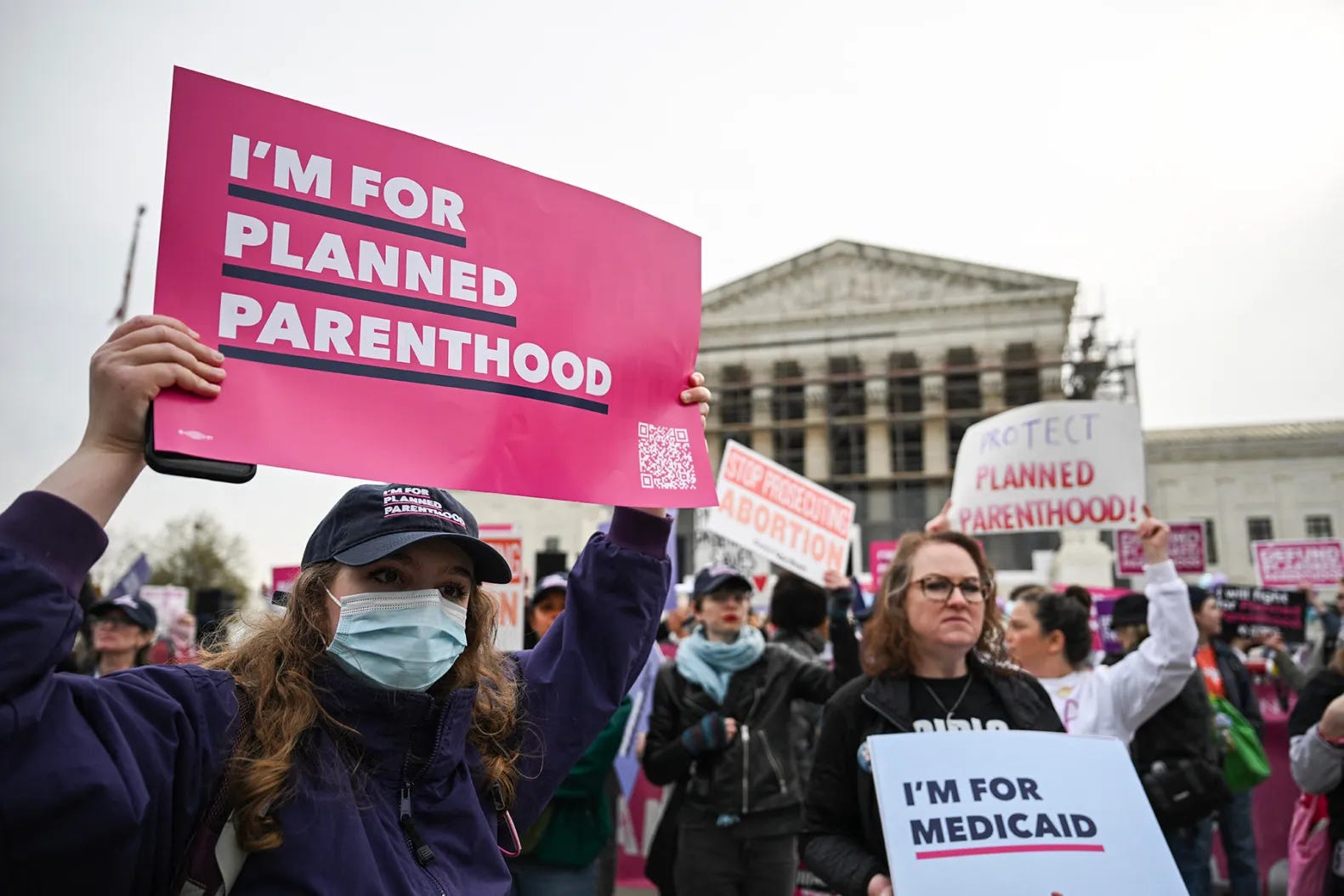SCOTUS strips Medicaid patients’ right to sue in Planned Parenthood case
The Medina ruling deals another blow to reproductive care as Democrats brace for GOP efforts to defund Planned Parenthood in Trump’s signature legislation.

First Things First
👋🏾 Hi, hey, hello! Welcome to Congress Nerd, Once Upon a Hill’s flagship newsletter recapping the biggest congressional storylines of the week all through a sharp lens of race, gender and class.
If you haven’t already, consider upgrading to a paid subscription to unlock the Sunday edition I publish each week when Congress is in session. It’s packed with smart scoops, floor previews and what I’m tracking on the Hill.
Anna Wintour is stepping down as editor-in-chief of Vogue after 37 years in a seismic moment in fashion media. Before I covered Congress, I also worked in that world, including a stint at a now-defunct Condé Nast magazine led by Eva Chen, whom Wintour had handpicked to run the title. Just a small thread in the tapestry of her influence and a reminder that everyone’s career path has its plot twists.
This summer heat is no joke, so I hope you’re staying cool. And don’t take it just from me: Senate Minority Leader Chuck Schumer (D-N.Y.) was hospitalized on Wednesday morning to be treated for dehydration.
“He wants to remind everyone to drink some water and stay out of the heat,” a spokesperson said.
In this evening’s edition, AOC reveals how she feels about the comparisons between her and Zohran Mamdani, the Democratic socialist who scored an upset victory on Tuesday evening in the New York City primary. I also asked House Minority Leader Hakeem Jeffries (D-N.Y.) to respond to criticism that he and Schumer—the two most powerful New York Democrats—should have taken a more active role in the race. And finally, a status update on the GOP megabill that President Donald Trump wants on his desk by July 4th, despite Hill Republicans’ split on how to offset several of the president’s key priorities.
But let’s start with another demoralizing Supreme Court decision for the movement for reproductive freedom.
The Medina decision: Another blow to reproductive care
Alexis McGill Johnson sat just feet away from me Thursday morning, testifying before House Democrats about the human toll of post-Dobbs abortion bans with stories of delayed care, denied procedures and lives upended.
Just minutes after McGill Johnson finished speaking, the Supreme Court issued another major decision: Medina v. Planned Parenthood South Atlantic. The ruling eliminated Medicaid patients’ ability to sue when states block access to qualified reproductive health providers, including Planned Parenthood.
“It was surreal seeing it pop up. In this day and age when technology hits you and it doesn’t give you a moment to actually process,” McGill Johnson told me in her first interview after the decision was announced. “But I can tell you that what it is a reflection of is a methodical, systematic approach to gutting our freedoms and our rights in returning us to second-class citizenry.”
She argued that America is in a moment of deep division when young people, women, people of color and undocumented immigrants are being systematically denied access to power and public resources.
“This is one more nail in trying to cement a regime that is built on power and control and determining who belongs in this country and who doesn’t, who gets access to the government resources and who doesn’t,” she added. “And it’s very clear to me that they are putting their crony billionaire friends at the top of that list and they are denying access to the majority of Americans in this country.”
Rep. Ayanna Pressley (D-Mass.), co-chair of the Reproductive Freedom Caucus, told me after she learned about the decision that the Supreme Court had been enlisted by the anti-abortion movement as co-conspirators in an aim to make people sicker in America.
“This is about cancer screenings. This is about STI testing. This is about a range of services that have nothing to do with abortion care that is now being ripped away from people,” Pressley, who was diagnosed with uterine fibroids at her local Planned Parenthood as a student at Boston University, added. “With this ruling, it is damning. We have to vigorously condemn it at every turn. And we’re going to have to stay in this fight.”
Want to reach the people shaping policy and politics? Once Upon a Hill puts your message in front of the Capitol’s most plugged-in audience—where influence meets insight. Let’s talk about how a sponsorship can align with your goals. Email michael@onceuponahill.com to learn more.
The 6–3 decision in Medina v. Planned Parenthood South Atlantic bans individual Medicaid beneficiaries from suing state officials under federal law to enforce a provision under the Medicaid Act that requires program patients to be allowed to obtain care from any provider.
The provision, known as the “any qualified provider” policy, ensured that Medicaid patients could obtain care from any qualified and willing provider.
Justice Neil Gorsuch wrote in the majority opinion that the Medicaid statute doesn’t confer individually enforceable rights under federal law. The Court said that if Congress wants to give people the right to sue under programs like Medicaid, it has to say so clearly—and that it’s up to the federal government, not individuals, to enforce those rules.
The decision reversed the Fourth Circuit and marked a significant narrowing of the legal avenues for challenging state actions that affect Medicaid provider access.
Justices Ketanji Brown Jackson, Sonia Sotomayor and Elana Kagan dissented, arguing that the ruling undermines beneficiaries’ ability to enforce federal healthcare guarantees.
McGill Johnson said since today was a Supreme Court decision day, she and her team were mindful that Medina could come today.
“It is not unlike the Dobbs decision that came down right around this moment that they wait until the end when they can leave town and run away from the decisions that will impact people in the same way that Congress likes to put these provisions in in the dark of night and then run away when they have to make these hard decisions from the very people who want to hold them accountable,” she added.
The case began in 2018 when South Carolina moved to exclude Planned Parenthood South Atlantic from its Medicaid program, citing state law barring public funds from being used for abortion. Planned Parenthood and a patient sued, arguing the exclusion violated a federal provision requiring Medicaid patients to be allowed to receive care from any qualified provider willing to treat them.
A federal district court blocked the state’s action and the Fourth Circuit affirmed. The Supreme Court initially vacated the ruling and sent the case back to the lower Court for reconsideration after a related decision in a 2023 case. But when the Fourth Circuit again sided with Planned Parenthood, South Carolina appealed a second time—and the justices agreed to hear the case.
Medina is part of a broader wave of litigation and political scrutiny targeting Planned Parenthood and other reproductive health providers following the overturning of Roe v. Wade. Anti-abortion activists and aligned legal organizations have increasingly shifted toward state-level restrictions and litigation aimed at weakening providers’ funding and public credibility.
The decision weakens a key enforcement tool for low-income Americans who rely on Medicaid because it effectively closes the courthouse doors to patients seeking to challenge a state’s decision to cut off access to certain qualified healthcare providers.
By ruling that Medicaid’s “any qualified provider” provision does not give individuals the right to sue under civil rights law, the Court shifts enforcement power solely to federal officials, despite long-standing concerns about limited oversight capacity.
The immediate effect is likely to be felt most acutely in states where conservative lawmakers are seeking to defund providers like Planned Parenthood, even when those providers offer a wide range of reproductive and preventive health services unrelated to abortion.
The ruling also sets a precedent that could limit private enforcement of other federal social programs, raising the bar for when beneficiaries can take legal action to ensure continued access to care.
And while Dobbs v. Jackson Women's Health Organization dealt with the question of abortion rights under the Constitution, Medina has narrowed access differently by limiting how Medicaid patients can challenge state efforts to cut off funding to providers that offer abortion or are affiliated with abortion services.
Together, the rulings illustrate how the Court’s conservative majority is reshaping reproductive health care not just by eliminating rights but by restricting the tools patients can use to enforce the rights they have left.
When the Dobbs decision was handed down in 2022, reproductive freedom advocates like Pressley and McGill Johnson were so devastated because they viewed Roe as the floor and never the ceiling.
“Even when Roe was the law of the land, again, there were still people being denied access to their fundamental freedoms and human rights, of which healthcare is one,” Pressley said. “There were already people that were dying. We already had a Black maternal morbidity crisis. We knew where this was gonna go. And again, because they're very quick to dismiss the outcries of women activists, agitators, lawmakers as histrionics and hyperbole, they didn’t believe us.”
The House-passed GOP megabill under consideration in the Senate would prohibit Medicaid payments to any family-planning clinic that provides abortions, including non-abortion services like contraception, STI testing and cancer screenings.
While the Senate parliamentarian recently removed one abortion-related provision affecting ACA subsidies, the defunding clause targeting Medicaid reimbursements for abortion-affiliated providers remains under active consideration.
If it is enacted, states could broadly block federal Medicaid dollars from reaching Planned Parenthood clinics, compounding the narrowing of legal recourse under Medina by eliminating access points to care that patients cannot constitutionally litigate.
McGill Johnson said Planned Parenthood and Senate Democrats presented a compelling case that the provision to defund Big Abortion is about defunding Planned Parenthood too.
“Medicaid doesn't provide for abortion care because of the Hyde Amendment in almost all circumstances,” she said. “I know that the Senate Democrats on the Finance Committee have made very, very strong, compelling arguments to the parliamentarian—and I really hope that reason prevails.”
Of Equal Importance
○ ● ● ● ●
GOP megabill faces fresh hurdles as Trump’s deadline nears
With President Trump’s July 4th deadline looming, GOP leaders are scrambling to finalize their sweeping tax, border, energy and defense bill amid procedural hurdles and internal discord.
Senate parliamentarian rulings have already forced Republicans to drop or alter several controversial provisions: Cuts to Consumer Financial Protection Bureau funding, pay reductions for Fed staff, repeal of parts of the Inflation Reduction Act (by rescinding EPA vehicle emissions standards), restrictions on judicial contempt enforcement, authorization for state-led border enforcement, a USPS electric‑vehicle mandate, the REINS Act (fast-tracking environmental review rollbacks) and added SNAP cost‑sharing requirements.
Meanwhile, wrangling continues over preserving the Medicaid provider tax and determining the SALT deduction cap, key fault lines in the Senate GOP’s internal negotiations. Although leadership maintains that the bill is on track, Democrats argue that these Byrd Rule violations and unresolved fiscal splits underscore just how rushed and fractious the reconciliation process has become under unified GOP control.
● ○ ● ● ●
Senators split over Iran strike impact ahead of House briefing
The fallout from President Trump’s weekend airstrikes on Iran’s nuclear sites continues to unfold. A classified Senate briefing exposed deep GOP–Dem splits: Republicans like Lindsey Graham (R-S.C.) and Tom Cotton (R-Ark.) praised the strikes as successful in destroying key facilities, while Democrats—including Sen. Chris Murphy of Connecticut—said they didn’t think the president told the truth when he said Iran’s program was obliterated. The House will receive a classified briefing on Friday morning.
● ● ○ ● ●
Ocasio-Cortez reflects on Mamdani’s win and progressive leadership
Rep. Alexandria Ocasio-Cortez (D-N.Y.) isn’t surprised that Zohran Mamdani’s name is now being mentioned in the same breath as her own.
After all, it’s not every day a 33-year-old democratic socialist defeats a former governor backed by big money and the Democratic establishment in a New York City mayoral primary.
But as comparisons to her own 2018 upset mount, Ocasio-Cortez points to a shared vision of leadership rooted in community, optimism, and working-class politics.
“Well, I think that Mr. Mamdani and myself, we have a very similar ethos in terms of not just a politics of the working class and for working people, but also really having people feel what our leadership and what leadership is supposed to be about, which is proximity to people in community, a positive, affirming vision and a belief that not only is change possible, but it's something that we want to pursue, that we're not just going to have an incremental change from the despair that people are feeling right now,” she told me earlier today.
Ocasio-Cortez rose to national prominence in 2018 after unseating Rep. Joe Crowley, a ten-term incumbent and member of House Democratic leadership, in a shocking primary upset that reshaped the party’s left flank. But there are key differences between her race and Mamdani’s: AOC ran for Congress, while he ran for mayor. And while Mamdani defeated a political heavyweight in former Gov. Andrew Cuomo, Cuomo wasn’t the incumbent—Mayor Eric Adams still holds the office.
● ● ● ○ ●
Jeffries defends neutrality in high-stakes NYC primary
As I mentioned up top, Mamdani’s upset victory raised questions about whether New York’s national Democratic leaders could have earned some goodwill by endorsing Mamdani instead of remaining neutral.
Hakeem Jeffries told me this week that he was just adhering to long-standing norms and stopped short of endorsing Mamdani in the general election. (The two did speak by phone and plan to meet in Central Brooklyn soon.)
“It has traditionally been the case that Democratic leadership doesn’t get involved in active Democratic primaries and allows the people to make the decision with respect to the best path forward,” he said. “It seemed to me to be appropriate to continue the precedent that national members of Democratic leadership should not put their thumbs on the scale aggressively.”
Both Jeffries and Schumer confirmed this week that they participated in the city’s ranked-choice election but declined to disclose how they voted or in what order they ranked the candidates. For some, their neutrality stood in contrast to their influence: Jeffries is the highest-ranking Democrat in the House and Brooklyn’s most powerful political figure; Schumer, the senior senator from New York, is a pillar of the national Democratic establishment.
In private, several city and state Democrats said they viewed the pair’s silence as a calculated decision to avoid alienating either side of the party ahead of the 2026 midterms. Cuomo’s presence in the race reopened old wounds from his combative and scandal-ridden tenure as governor. But he still maintained allies across the city’s political and labor infrastructure. Mamdani, meanwhile, energized a new generation of left-leaning organizers and voters who view the Democratic leadership’s caution as complicity in the status quo.
That tension is now out in the open. In the days since the election, some progressives have questioned whether the city’s top Democrats were attempting to hedge their bets or simply underestimated the Mamdani coalition. Others argue their silence speaks to a broader discomfort among party elites with the growing influence of democratic socialists and grassroots organizers within the state’s political machinery.
Whether that silence helped or hindered either candidate remains an open question. But with Mamdani now the presumptive Democratic nominee for mayor of the country’s largest city, the decision by Jeffries and Schumer to sit out the primary—at least publicly—may have lasting consequences in the battles to come.
● ● ● ● ○
House unanimously condemns Minnesota attacks, calls for unity
The House on Wednesday unanimously passed a resolution in a 424–0 vote condemning the targeted attacks earlier this month on Minnesota state lawmakers in Brooklyn Park and Champlin.
Sponsored by Rep. Kelly Morrison (D‑Minn.), the measure denounces political violence, honors the lives lost and wounded, and calls on lawmakers and citizens alike to embrace unity and reject politically motivated brutality both in Minnesota and across the United States.
It comes as lawmakers confront a rising tide of political violence and renewed concerns about the safety of elected officials, including their own colleagues in Congress.
Speaker Mike Johnson (R-La.), Leader Jeffries, Rep. Bryan Steil (R-Wisc.), and Rep. Joe Morelle (D-N.Y.)—the chair and ranking member on the House Administration Committee—met today to discuss potential steps to better protect members.
In a joint statement, Johnson and Jeffries described the meeting as productive and acknowledged the urgency of the moment. They added that Steil and Morelle will work with relevant committee chairs to chart a path forward.
Read All About It
“‘They’re not breathing’: Inside the chaos of ICE detention center 911 calls” by Dhruv Mehrotra and Dell Cameron: “Records of hundreds of emergency calls from ICE detention centers obtained by WIREED—including audio recordings—show a system inundated by life-threatening incidents, delayed treatment and overcrowding.”
“Thousands of LGBTQ+ veterans were supposed to get pardons. A year later, only four have succeeded” by Leah Rosenbaum: “President Joe Biden had pledged to use his clemency powers to right ‘a historic wrong.’ Why did it fall so short of its promise?”
“With Trump, flattery gets NATO somewhere” by Daniel J. Wakin: “The NATO leaders gathered together to praise Donald Trump (and get an item or two they wanted too.)
“At work, in school, and online, it’s now AI versus AI” by John Hermann: “Chatbots fighting chatbots is the new normal.”
“Don’t let Silicon Valley move fast and break children’s minds” by Jessica Grose: “The federal government needs to step up and regulate artificial intelligence now.”
“Finding pleasure after pain” by Katie Simon: “For some assault survivors, ‘good sex’ doesn’t happen easily. Sometimes it’s not even the goal.”
“I don’t like my in-laws. Is that a problem?” by Allie Volpe: “What do you actually owe your partner’s family?”
“The Bear’s fourth season is one long apology” by Sam Adams: “The FX hit show is as stuck as its protagonist.”




